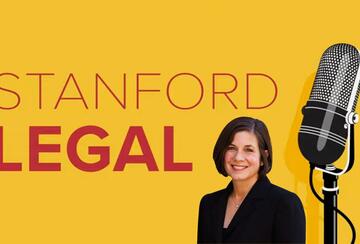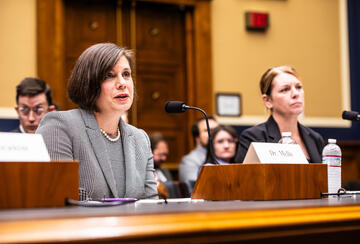Health Policy News
SHP's Michelle Mello argues there are late-career physician programs that can balance patient safety with procedural fairness.
SHP’s Michelle Mello and former CDC Director Rochelle Walensky offer recommendations to clinicians struggling to follow new vaccine guidelines.
Stanford Law’s Michelle Mello—also a professor of health policy—discusses how sweeping changes in federal health policy are reshaping public health—and leading states to fill the void.
SHP's Michelle Mello joins a global group of 65 thought leaders from academia, technology companies, regulatory agencies, and health systems dissected and debated actionable solutions to effectively, safely, and responsibly deploy AI into clinical practice.
Stanford Health Policy's Michelle Mello testifies about opportunities to advance American health care through the use of AI technologies.
To help health care leaders and clinicians navigate the thorny terrain of using artificial intelligence (AI) tools in their testing and care, SHP's Michelle Mello and colleagues provide a framework for deciding what patients should be told about AI tools.
In this JAMA Viewpoint, SHP's Michelle Mello discusses the paucity of formal regulations dealing with artificial intelligence in health care and what may lie ahead.
This week marks the fifth anniversary of COVID being declared a global pandemic. SHP's Michelle Mello joins the Science Quickly podcast for Scientific American.
A new study by SHP's Marissa Reitsma and Michelle Mello finds that extending prescription drug rebates to commercial health plans could lead to big savings.
A paper co-authored by Stanford Law School’s Michelle Mello examines policies that health-care organizations are implementing to address potential risks associated with cognitive and physical decline in late-career physicians (LCPs).
Michelle Mello, a professor of law and of health policy, wins the annual teaching award at Stanford Law School, where her students call her an inspirational leader and committed mentor.
According to the co-authors of a perspective published in the New England Journal of Medicine, the use of AI diagnostic tools by medical practitioners can lead to unexpected financial burdens for their patients.
Stanford Health Policy's Michelle Mello discusses how the law, artificial intelligence, and the COVID-19 pandemic have shaped health care in this Q&A with The Regulatory Review.
The Supreme Court ended its 2024 term with major rulings affecting federal agencies. SHP’s Michelle Mello writes in a JAMA viewpoint that while these rulings have critical ramifications for health agencies, the outlook is more complex than it might appear.
SHP's Michelle Mello and colleagues find that the most impactful court-imposed restrictions on health orders during the pandemic were in two key areas: orders that restricted religious activities, and actions taken by state and federal agencies.
Michelle Mello and colleagues argue that state legal reforms have exacerbated rather than improved weaknesses in U.S. emergency powers revealed by COVID-19, jeopardizing future responses.
In her testimony before the U.S. Senate Finance Committee, Mello emphasized the need for federal guardrails and standards regarding the use of artificial intelligence in health care.
Research led by SHP’s Michelle Mello provides some clarity regarding liability over AI technologies that are rapidly being introduced to health care. She and her co-author analyzed more than 800 tort cases involving both AI and conventional software in health care and non-health-care contexts to see how decisions related to AI and liability might play out in the courts.

SHP's Michelle Mello and Stanford Medicine colleagues write in the journal JAMA that President Biden's recent executive order on Artificial Intelligence could have significant implications for health-care organizations.
The Supreme Court decision concerning Title VII of the Civil Rights Act of 1964 raises new questions about the ability of private employers—including health-care organizations—to enforce vaccination requirements for employees who have religious objections. In this JAMA Health Forum commentary, Michelle Mello and colleagues consider the implications.

Michelle Mello and colleagues write in this JAMA Network Viewpoint that civic values were eroded during the COVID-19 pandemic, creating a groundswell of resistance to vaccines that have been a bedrock principle of U.S. public health policy.

In this commentary in the San Francisco Chronicle, Stanford Health Policy's Michelle Mello — professor of health policy and professor of law — shares her personal account of the year-long struggle to diagnose her husband's autoimmune disease.
ChatGPT and Physicians’ Malpractice Risk
In this JAMA Forum perspective, SHP's Michelle Mello, professor of health policy and of law, and Neel Guha, a Stanford Law School student and PhD candidate in computer science, write that medical advice from AI chatbots is not yet highly accurate, so physicians should only use these systems to supplement more traditional forms of medical guidance.
SHP's Marissa Reitsma and Michelle Mello conduct an original investigation that finds allowing the U.S. Centers for Medicare & Medicaid Services to negotiate prescription drug prices for Medicare may improve drug affordability.

























